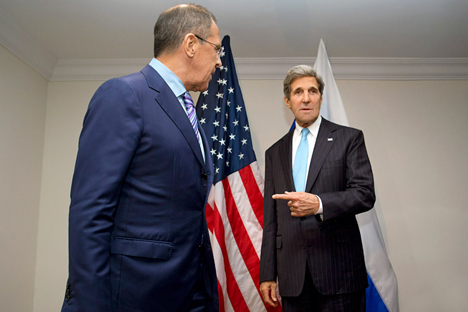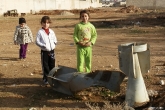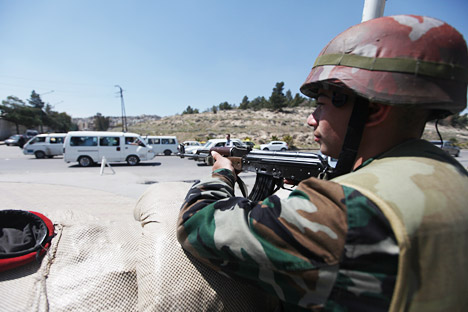Syria conference fails before it starts

U.S. Secretary of State John Kerry gestures toward Russian Foreign Minister Sergey Lavrov (L), as he deflects a question from a reporter about whether they will discuss asylum for NSA leaker Edward Snowden, at the ASEAN summit in Brunei. Source: AP
The talks in Brunei between Russian Foreign Minister Sergey Lavrov and US Secretary of State John Kerry have clarified the key problems in Russian-American relations. Moscow and Washington are resigned to failure of the initiative to hold an international conference on Syria – Geneva-2 – and the question now is who will be the first to announce this. In addition, the Russian authorities have made up their minds on President Obama’s recent proposal for drastic bilateral cuts in nuclear arsenals: Moscow considers the initiative to be tokenism and rejects it.
The seventh meeting between Sergey Lavrov and John Kerry since February, when the latter became US Secretary of State, was largely devoted to Syria, as indeed were all the other meetings. Yet, while previously the two countries’ top diplomats expressed optimism regarding the chances of a diplomatic solution to the Syrian conflict, the mood has now changed. The reason is the problems that cropped up in preparing an international conference on Syria: the date and the composition of Geneva-2 have failed to be agreed upon.
Talking to journalists on the fringes of the East Asian foreign ministers’ summit in Brunei, after his meeting with Kerry, Sergey Lavrov said that the Americans were continuing their attempts to “achieve a consolidation of the Syrian opposition on the platform of the Geneva communiqué.” Even so, a source close to the Russian delegation said that “the USA is simply keeping the idea afloat but, in reality, is not going to hold the conference.” “Proof of this is Washington’s decision to start supplying arms to the Syrian rebels.” Another participant in the talks, Saudi Arabia, also opposed Geneva-2, the source explained, concluding that “a diplomatic game is under way over who will be the first to announce that the initiative has failed.”
The scandal around former CIA agent Edward Snowden was expected to be the second topic of discussion between Lavrov and Kerry. It was the main topic for the US journalists. One of them spent a whole morning posing as a tourist trying to waylay Lavrov at the entrance to the hotel and tried, without success, to ask him about the former CIA analyst. Then, at the very start of the talks, a Washington Post journalist asked if Russia would grant political asylum to Edward Snowden. “Don’t shout at me,” the Russian Minister shot back in English.
Related:

No civil war in Syria - Russian Minister
Moscow condemns supplies of weaponry from Libya to Syria
After the talks, Sergey Lavrov said that he had not discussed Snowden with John Kerry. “Our president has said it all. They (the Americans) understand it,” the minister explained.
A recent addition to the list of differences concerns Barack Obama’s initiative to raise the level of trust between the USA and Russia by drastically cutting the two countries’ nuclear arsenals. Earlier, Deputy Foreign Minister Sergey Ryabkov said that Moscow would study Washington’s proposal. By the time of the Brunei meeting, Russia seemed to have made up its mind.
A Russian diplomatic source told Kommersant that Barack Obama’s initiative was largely token in character “because, in parallel, the USA is developing other types of weapon, refusing to ratify the Comprehensive Nuclear-Test-Ban Treaty and considering placing weapons in space.”
So Moscow has effectively rejected Barack Obama’s proposal.
First published in Russian in Kommersant.
All rights reserved by Rossiyskaya Gazeta.
Subscribe
to our newsletter!
Get the week's best stories straight to your inbox
